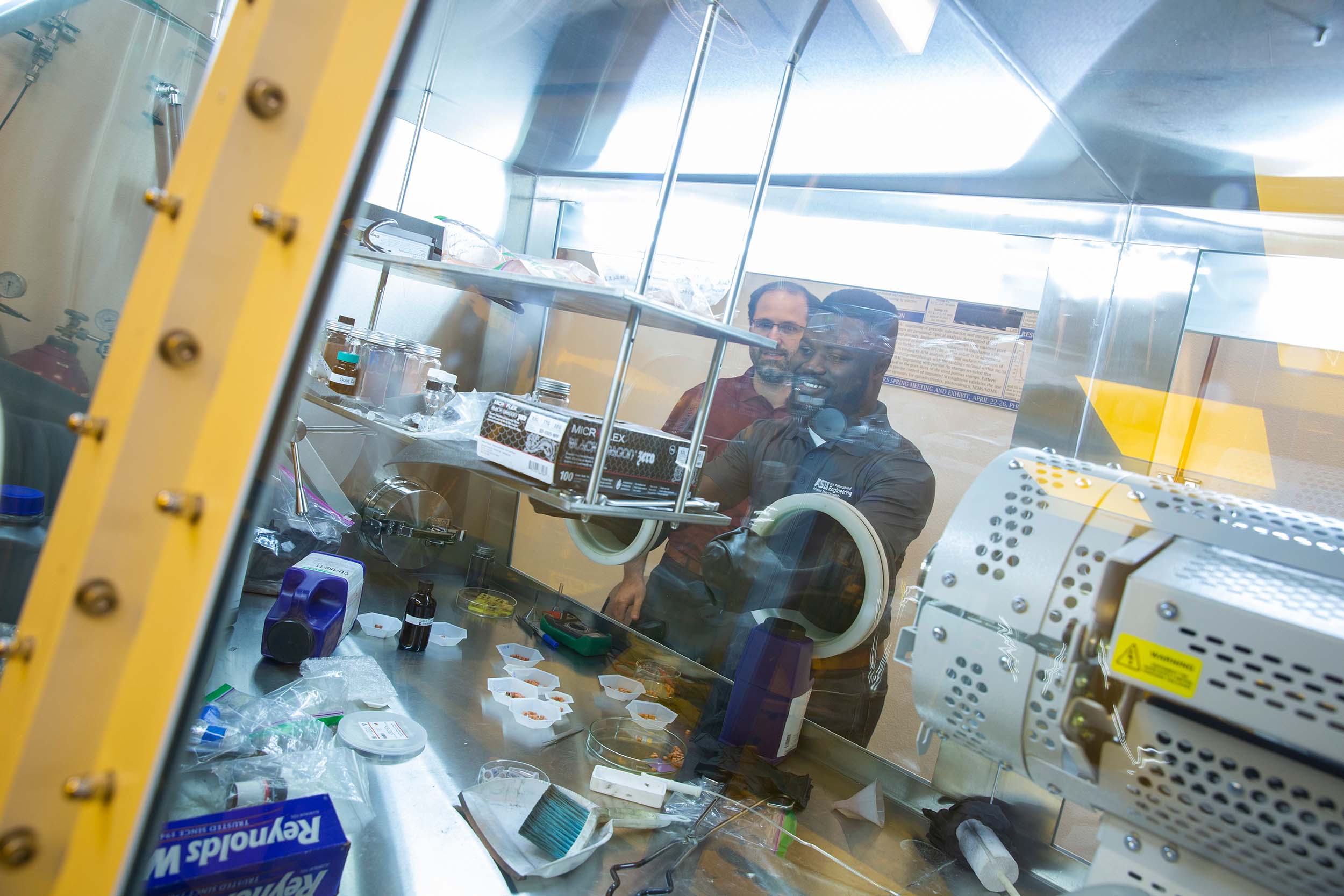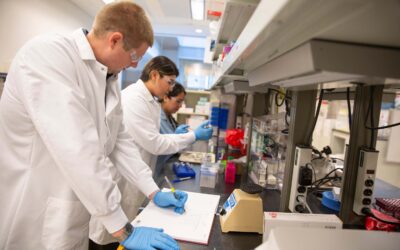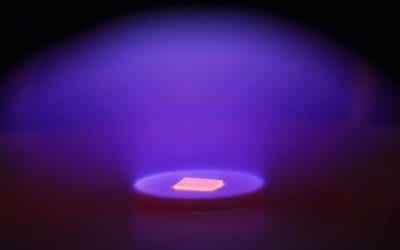ASU debuts manufacturing engineering doctoral program
By Sona Srinarayana
January 5, 2023

As the first school in the United States to offer three degrees in manufacturing engineering — a bachelor’s degree, master’s degree, and a newly launched doctoral degree — the School of Manufacturing Systems and Networks, part of the Ira A. Fulton Schools of Engineering at Arizona State University, is becoming a premier destination for manufacturing engineering.
“We have completed the trifecta in manufacturing engineering education at ASU,” says Binil Starly, professor and director in the School of Manufacturing Systems and Networks. “It is our priority to fill curriculum gaps and offer all-inclusive programming to support the American manufacturing sector. The launch of this degree proves that we are on that path but we still have work to do.”
Launching a doctoral degree program in manufacturing engineering is quite a feat for ASU’s newest engineering school, which officially opened its doors last fall.
Enrollment in the manufacturing engineering doctoral degree is now open for the fall 2023 semester. Students in the program can expect to be at the leading edge of manufacturing research, learning from research-active faculty and leveraging the ongoing and future investments in manufacturing education and research, including more than $2 million in shared equipment and $5 million in faculty lab resources.
Students will gain deep, domain-specific manufacturing knowledge, contribute to the field in impactful ways and have opportunities to collaborate with key industry partners through research that will take a direct pathway to industry application.
Manufacturing engineering doctoral graduates will drive research and development agendas for the advanced manufacturing economies of the 2030s, 2040s and beyond.
“It’s an exciting time to make an impact in this thriving field,” Starly says.
Leading the country in manufacturing education
Dhruv Bhate, an associate professor and program chair for the new manufacturing engineering doctoral program, believes American manufacturing is at an inflection point and that amplified education in this field is a critical piece in supporting the overall manufacturing landscape.
“Nationally, there is a renewed interest in and commitment to the advanced manufacturing sector and an appreciation about its importance to our economy, national security and societal resilience,” Bhate says. “This new program lands squarely in this space and time, rife with opportunity.”
Bhate adds that there’s a confluence of factors that have brought American manufacturing to the limelight. First, the increased use of artificial intelligence, or AI, and robotics; second, the new materials and processing technologies available; third, national security and supply chain interests; and fourth, a greater focus on energy, sustainability and the environment.
The major thrust areas of the School of Manufacturing Systems and Networks align with these factors and include manufacturing sciences and engineering; robotics, automation and autonomous systems; and data sciences, AI and cyber-manufacturing.
Starly believes that providing versatile, comprehensive and interdisciplinary manufacturing knowledge and resources to students in these areas through robust and adaptable curriculum is integral to tackling industry 4.0 challenges.
Preparing students through experiential learning
To prepare doctoral students for new and upcoming manufacturing challenges, the school is offering a curriculum packed with project-based courses focused on addressing problems and developing solutions that require the application of concepts learned across multiple domains.
“Traditionally, manufacturing R&D teams have relied on mechanical, materials, chemical, industrial and software engineers working together,” Bhate says. “We believe that unlocking innovation in the future will increasingly rely not just on experts from different domains working together, but from the innovation that emerges from the direct exploration of ideas that arise from a fundamental understanding of these interdisciplinary topics.”
Bhate incorporates this philosophy into the courses he teaches.
“In my additive manufacturing course, for example, students complete projects that involve designing a part, 3D printing it and characterizing its material properties,” Bhate says.
Project-based courses often involve industry engagement — another critical component to preparing students for careers in manufacturing.
Currently, industry partner PADT, Inc., a leading provider of numerical simulation, product development and 3D printing products and services based in Tempe, Arizona, is working on two projects with manufacturing engineering faculty and graduate students in the Manufacturing Automation and Data Engineering Science and Technology Center, or MADE STC, to put novel research on a direct pathway to industry application.
As the School of Manufacturing Systems and Networks expands, so will the MADE STC, featuring new projects that will be in sync with industry demands.
The development of Science and Technology Centers at ASU has been made possible by the New Economy Initiative, an investment by the state of Arizona to advance ASU’s assignment to drive the state’s future economic growth and resiliency through engineering and technology innovation and training infrastructure.
Industry partners including FANUC, Rockwell Automation, Honeywell, Intel and Lallemand Baking among others, are also collaborating with the School of Manufacturing Systems and Networks on various manufacturing projects and initiatives. Strategic partnerships like these enable companies to recruit talent into their facilities and fast-track innovative manufacturing solutions.
Students in the manufacturing doctoral program will also have an opportunity to learn and collaborate in a new Center of Excellence at ASU’s Polytechnic campus launching in 2023 and supported by various community partners including FANUC, APT Manufacturing Solutions, Honeywell, Klein Educational Systems and other collaborators. The Center will house millions of dollars worth of robotics equipment and facilitate opportunities in manufacturing research, industry training, education and community upskilling and reskilling.
Arizona’s sizable manufacturing industry and regional strengths in aerospace and defense, and semiconductor, automotive and energy manufacturing will play a large role in the types of industry projects students will have the opportunity to impact.
Imagining the future of manufacturing education at ASU
The manufacturing engineering doctoral program is currently supported by 15 faculty members who actively conduct research. There are plans to grow to 30 to 35 research-active faculty and enroll 140 to 160 doctoral students in the next five years.
In addition to the manufacturing engineering doctoral degree, the school plans to launch revamped bachelor’s and master’s degree programs in manufacturing engineering in fall 2024.
This year, ground will break on a new 180,000 square foot facility on the Polytechnic campus to further support the university’s educational and research mission and further explore semiconductor manufacturing, non-destructive evaluation, materials characterization and testing, and new process development among many other new and existing initiatives.
“We are pushing the boundaries of manufacturing education in this country,” Starly says. “Resources put in place by our school, the state and community partners will enable our students and faculty to make manufacturing advancements that haven’t yet been defined.”
Fulton
Researchers
Binil Starly
School Director and Professor
School of Manufacturing Systems and Networks
Dhruv Bhate
Associate Professor
The Polytechnic School
Related Stories
Decarbonization efforts earn international recognition
ASU Professor Sridhar Seetharaman’s distinction as International Fellow of the Royal Swedish Academy of Engineering Sciences is on par with the NAE in the U.S.
Graduate students connect with industry through use-inspired research
Three Fulton Schools doctoral students were selected as NSF scholarship recipients, funding industry internships connected to their dissertation focus
ASU researchers use diamonds for electrical power
Professor Trevor Thornton leads research through ASU’s AMPED Science and Technology Center to create diamond and boron nitride transistors
ASU to advance proposal for CHIPS and Science Act funding
Regionally collaborative proposal to advance microelectronics research, development and manufacturing in Southwest as part of national network



